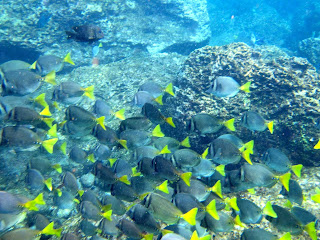For a change of pace, after being in Puerto Vallarta for
several weeks, we anchored at Isla Isabel, a remote island about 80 miles
northwest of Banderas Bay. Because of its isolation, it is free of predators, so the island
is a haven for blue-footed boobies, frigate birds and iguana’s.
Rock islet off Isla Isabel
There are fishermen on the island, so we had to dodge
their long lines as we approached. The rocks that surround the island have a
reputation for swallowing anchors, so after motoring to the GPS coordinates
provided by our cruising friends on Shindig, our
diver crew member, John Graves, dove to find us the perfect spot to drop our anchor in
sand. But it was also very close to one of the rock towers on the eastern shore
of the island. It is only a good anchorage in calm conditions.
John snorkeling to find a safe anchor spot
This is the beach where we landed, near an abandoned
research station. The local fishermen use the abandoned buildings as the base
for their fishing operation.
Landing zone and fish camp
The island became a National Park in 1981 and a World
Heritage Site in 2003.
Isla Isabel National Park
Iguana were everywhere on the island.
Iguana at the abandoned research station
Frigate birds, with their angled wings and split tails are
fun to watch when we are sailing and they are a good indicator of schools of
feeding fish. But they also like to hitch a ride atop the instruments on our
masthead and try to catch our fishing lures, so they can be a pain at times.
Frigate Bird
Frigates nesting in stubby trees covered the southern end of
the island and most of the trees had females taking care of their young. You
could get quite close to them before they made any protest.
Frigate baby in nest
We could walk quite close to the frigate birds and their young.
Adolescent frigate
The males made their presence known by puffing up their
bright red throat pouches.
Male frigate showing his "gular"
We hiked over to the eastern side of the island, home of the
blue-footed boobies.
Steps leading to the other side of the island
Their feet are definitely very blue. Unlike the frigates, the boobies were more skittish of two-legged visitors. The ones who weren’t nesting moved deeper into the bushes as we approached.
Blue Footed Booby
But the nesting birds stayed on their nests when we
approached. And the guards stayed nearby.
Guarding the nest
Nesting
Blue-footed boobies are known for their mating dance. Lift
one foot and hold it in the air, then do the other one. Repeat again and again …
The Booby mating dance
On our way back to the boat, the fishermen were busy getting ready to depart. The fish on the beach were being used as bait for their long lines.
Fishermen ready to depart
We did some snorkeling near the boat. Lots of different types of fish.
Snorkeling next to the boat … school of Surgeon fish
Isla Isabel sunset
The good weather forecast continued so rather than sailing to Mazatlan and staying there for a couple days, we sailed directly from Isla Isabel to La Paz … about 300 miles and two overnights. We had great conditions and minimal ship traffic all the way.
Serious helmsmen starting our 300 mile passage to La Paz



















Great fun and a great write-up of our adventure. But I've repeatedly tried the mating dance described to no avail. John
ReplyDelete